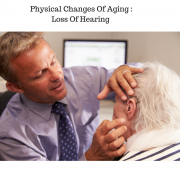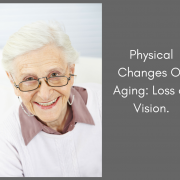Physical Changes of Aging: Loss Of Hearing.
Hearing loss is another physical change that seniors experience. Approximately one in three seniors between the ages of 55 – 74 have hearing loss and nearly half of those older than 75 have difficulty hearing. Also, research shows that men are more likely to have hearing loss than women. Having hearing loss issues can disrupt a lot of activities of daily living for seniors, it can take away independence and the ability to socialize with friends and family. It can greatly impact communication and functional ability as well.
Hearing disorders can also disrupt the balance in the inner ear, which will likely lead to a fall, causing serious injuries.
Causes of Hearing Loss:
- Hearing loss occurs due to old age. Age related hearing loss, most often occurs in both ears gradually.
- Lifetime exposure to loud noise. A very good example are people whose career paths have been Factory workers, Construction workers, Airport workers, Musicians etc. Working in professions like these can over the years build up issues with loss of hearing.
- Hearing loss can also be caused by viral or bacterial infections.
- A severe head injury or brain injury can also affect hearing.
- Genes can also play a role.
Treatment Options are :
- The use of a hearing aid.
- Assistive listening devices.
- Surgical Implants.
- Lip or speech reading and sign language.
Hearing Loss if left untreated could lead to deafness and seniors who do not address their hearing loss put their lives at risk for example if a senior is unable to hear emergency warnings such as car horns or smoke alarms.
It is advisable for seniors to have their hearing tested at least once a year to prevent avoidable injuries.


